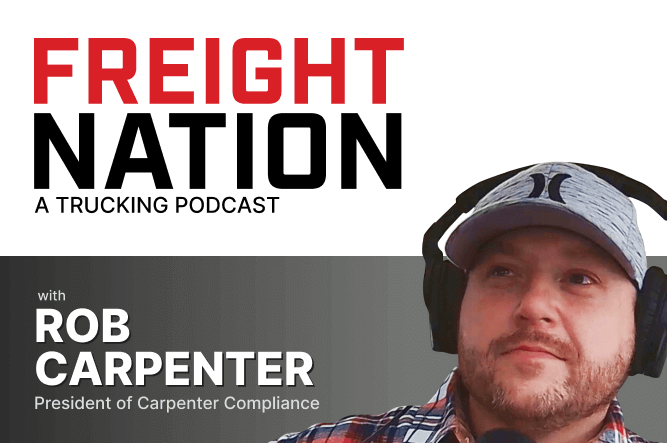Podcast: Compliance Isn’t Just a Box to Tick with Rob Carpenter, President of Carpenter Compliance

Listen up!
Check out our trucking podcast, Freight Nation.
Compliance. It’s not a popular topic to discuss, but it’s essential for the industry. To be compliant means to be safe and legal—both of which help a business be profitable and sustainable.
In this episode, compliance expert Rob Carpenter sits down with host and Truckstop Chief Relationship Officer, Brent Hutto, to dive into the importance of compliance and how to leverage it to your advantage.
A Hard Entry into Compliance
Rob’s transportation career started in driving, as he was drawn in by the practical side of things. But he wasn’t a rule-follower. Admittedly, he could be reckless at times—ignoring the guidelines and overworking.
So, how did he end up in compliance?
Well, it came from a tragic incident.
Rob was hit by a truck, rendering him temporarily unable to walk. As he went through the rehabilitative processes, he realized how important safety was, and he now advocates the importance of safe and legal truck driving practices.
Is Compliance Always Enough?
Anyone who can read a book can grasp compliance at its most basic level, but putting it into practice is a different story.
Rob explains that you have to remember, “You can be compliant and still face exposure.”
For example, you can use CDL instead of a road test and still be compliant. However, if your driver does this and then gets into an accident, the plaintiff’s lawyer could say, “Yes, you were compliant, but how much time would it have taken to do a road test just to check if the guy could drive?” which will only open up a whole can of worms.
Compliance often leaves many holes in your system that a plaintiff’s attorney will extort should accidents happen. To be protected, you need to find and fill these holes, limiting your potential for exposure.
Pitfalls to Avoid
No matter what your feelings on compliance are, it is important to apply them to your daily practices and take time to understand why they have been implemented.
Neglecting truck maintenance should also be a key focus. This not only can lead to compliance and regulatory issues, but can also result in significant loss of time and money.
Hours of service are also important to adhere to when driving. Violating these can result in huge civil penalties and unsatisfactory safety ratings, negatively affecting your future business.
“Those [hours of service] violations are eating them alive, not just in civil penalties, but unsatisfactory ratings. Our biggest business right now is getting safety ratings upgraded back to at least operational status, and a lot of it is hours of service violations.”
Finally, make sure you’re on top of driver fitness. Consider a driver’s full qualifications, and don’t ignore red flags. Take time to hire reliable drivers and ensure they receive constant training. If they’re not the right person and don’t follow company processes, you can end up with violations that affect the business—leaving you to bear the burden.
To learn more about how ocean freight impacts the supply chain, tune into this episode of Freight Nation: A Trucking Podcast on Apple, Spotify, or your favorite podcast platform.

Find out how our platform gives you the visibility you need to get more done.
Get helpful content delivered to your inbox.
Schedule a demo.
Find out how our platform gives you the visibility you need to get more done.





